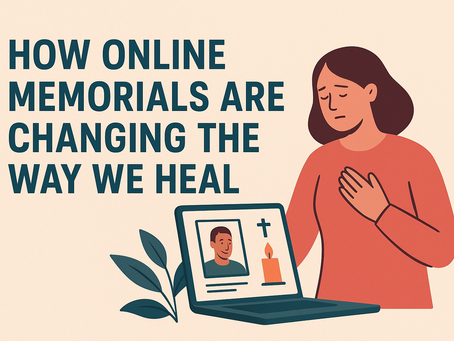top of page



Healing After Suicide: Grief, Remembrance, and Finding a Way Forward
Healing after suicide is complex and deeply personal. Healing after suicide is unlike any other kind of grief. When someone you love dies by suicide, the loss doesn’t arrive quietly — it crashes into every part of your life, leaving shock, unanswered questions, guilt, and silence in its wake. Many people who experience suicide loss describe it as living in two worlds: the one before, and the one after. And in the “after,” the pain is often complicated by shame, stigma, and a

Eugene Wynyard
Jan 263 min read


The New Language of Grief: Why We Need Better Words for Loss
Every mourner, at some point, searches for language — for words that can hold what feels uncontainable. But language for loss cannot be borrowed from cliché; it must be born of courage.
To say “I lost my child” or “I miss my friend who died by suicide” is not a failure of strength — it is the purest form of it. Each time we name grief truthfully, we push back against the silence that has long defined our culture’s relationship with death.
Because words are not just expression

Eugene Wynyard
Oct 25, 20254 min read


Beyond Flowers and Funerals: The Future of Remembering Loved Ones
For generations, we’ve said goodbye with flowers, funerals, and the closing of a coffin lid — a ritual meant to bring closure. But too often, that “final goodbye” becomes just that: final. The story stops too soon.And for those left behind, the silence afterward can feel unbearable. The truth is, remembrance doesn’t have to end when the funeral does. In fact, that’s when real remembering begins. Why Traditional Funerals End the Story Too Early Funerals help us acknowledge los

Eugene Wynyard
Oct 20, 20252 min read


How Online Memorials Are Changing the Way We Heal
💫 A New Way to Remember — and to Heal There was a time when remembrance ended at the gravesite — a service, some flowers, and a fading memory. But grief doesn’t work like that — and neither does love. Today, remembrance has evolved. We now have spaces that embrace connection, storytelling, and healing — long after the funeral ends. At Memories After , we believe that remembering isn’t about the past — it’s about how we continue loving in the present. 🌐 Grief Has Moved Onlin

Eugene Wynyard
Oct 18, 20252 min read
bottom of page